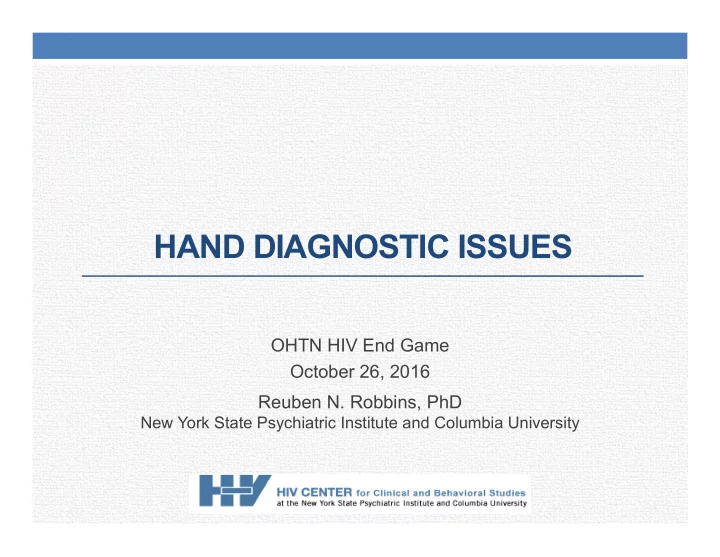

HAND DIAGNOSTIC ISSUES OHTN HIV End Game October 26, 2016 Reuben N. Robbins, PhD New York State Psychiatric Institute and Columbia University
Disclosures • No financial conflicts of interest to disclose • Funded by NIH: NIMH, NIAID, NINR, NICHD
Clinical Presentation Memory problems Slowed thinking Concentration problems Planning difficulties Multitasking difficulties
Consequences Disrupt ADLs/IADLs Work/employment difficulties Mild symptoms can predict further decline Lower quality of life Greater need for social services Neurocognitive deficits linked to greater HIV risk behaviors and poor decision making
Clinical Assessment Neuropsychological Assessment/Evaluation Detailed history: medical, psychiatric, psychosocial, education, work/employment/functional status Series of tests to evaluate domains of cognitive functioning (usually multiple tests per domain): Verbal and visual learning and memory Working memory/attention Motor functioning Speed of information processing Executive functions (set-shifting, problem solving, abstract thinking) And measures for psychological/emotional functioning
HAND Nosology Developed primarily for research to describe the cognitive effects of HIV Where cognitive effects not better explained by factors/co-morbidities other than HIV Asymptomatic Neurocognitive Impairment (ANI) Mild Neurocognitive Disorder (MND) HIV-Associated Dementia (HAD)
HAND Criteria ANI Abnormality in two or more cognitive abilities MND (≥ 2 cognitive domains, each 1 SD below mean) Abnormality in two or HAD No functional more cognitive abilities Marked cognitive impairment (≥ 2 cognitive domains, impairment (2 each 1 SD below mean) cognitive domains, 2 SD below mean) With marked With mild functional functional impairment impairment
Screening for HAND In absence of a neuropsychological evaluation, screening tests can assist in detecting HAND Recommended for routine and ongoing care/monitoring (e.g., at HIV diagnosis, at regular check-ups, and/or use algorithms to screen most at risk for HAND) Commonly used tests in HIV, such HDS, MoCA, and MMSE, relatively brief and easier to administer than a neuropsychological battery However, these tests often lack adequate sensitivity and/or specificity to detect mild HAND
Screening for HAND Computerized/tablet-based screening tests may be better at detecting milder forms of HAND CogState CAMCI Brain Baseline NeuroScreen Easy to administer by non-specialized personnel Hold potential to be scale-able and more easily implementable than paper-and-pencil tests ‘Connected’ technology can integrate into EMRs, databases/big data platforms
Screening for HAND Ongoing research to evaluate screening tests sensitivity and specificity to detect mild impairment in a variety of HIV populations Older age Co-morbidities Different countries/languages Resource limited settings, e.g., inner New York City and sub- Saharan Africa Still very important to know the normative sample used to validate the test Computerized tests, at least currently, do not include measures of mental health (e.g., depression) or daily functioning
Screening for HAND Important caveats for screening tests: Not definitive – trying to find patients most likely to have HAND/impairment Test subject to false positives and false negatives In absence of definitive biomarker, must work with these short comings Often not done with a detailed history Positive result on a screening test should trigger follow-up evaluation
Challenges Is it normal aging? How bad is it? Do I have Alzheimer’s? What can I expect? Level if impairment in HIV can fluctuate over time Pre-ART/post-ART Is it due to HIV? Is it ART toxicity? What role are co-morbidities playing? What do we do?
Other Challenges Research has identified numerous challenges to neurocognitive testing: Education Language Cultural acceptance Test exposure Norms Provider and patient awareness/concern
Recommend
More recommend